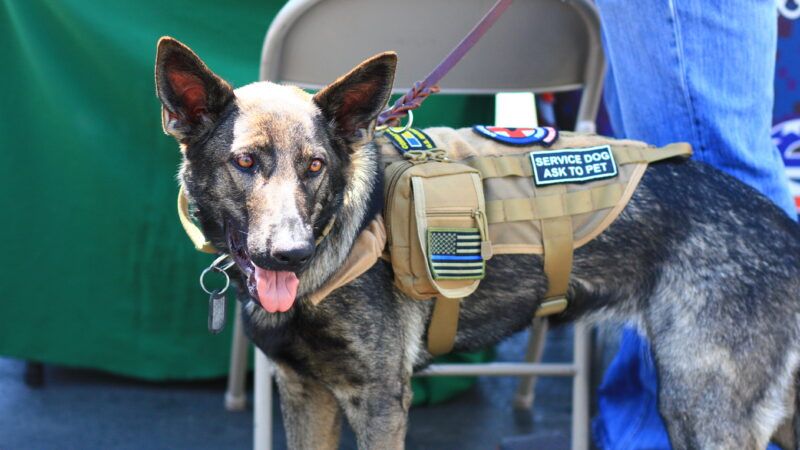Cops Tase a Veteran's Service Dog During an Unconstitutional Arrest for Panhandling
The dog died after the man went to jail for exercising his First Amendment rights.

A homeless veteran routinely collected money at an intersection in Gastonia, North Carolina. On October 13, he paid for that with both his freedom and his service dog.
That day, a woman phoned 911 to complain that Joshua Rohrer was "using [his] dog to get money." That dog was Rohrer's service animal, which he acquired for the Post Traumatic Stress Disorder he developed after completing a tour overseas in the U.S. Army.
The operator was clearly confused. "Do you think the [dog is] in danger?" he asked. "Like, how [is he] using the dog to get money?"
"They're using this dog to make people feel sorry for them," the woman responded. The dispatcher noted that he's "not sure there's anything illegal about that."
Where there's a will, there's a way. An officer with the Gastonia Police Department arrived at the intersection, told Rohrer he was breaking the law, and asked to see his identification. Rohrer disputed that he'd done anything illegal. The officer then requested backup, apparently believing that calling all-hands-on-deck to stop a panhandler was a prudent use of law-enforcement resources. The cops insisted that Rohrer show them a state ID, which he didn't have; he carried only his Veterans' Affairs card. According to eyewitness accounts, he was arrested shortly thereafter.
"The officer asked him for his ID," Justyn Huffman told the local NBC affiliate. "He wasn't moving fast enough so he tried to reach into his pocket to get his ID. They slammed him up against the car. They put cuffs on him."
An officer also tased his service dog, Sunshine, who ran off. Rohrer asked if they could retrieve her and bring her with him. "They laughed at me," he told Army Times. The dog has since died, having been hit by a car.
As of press time, the Gastonia Police Department has not responded to Reason's request for comment.
Rohrer was booked for solicitation and for resisting arrest. The primary charge—that he was begging for money—is part of an effort to restrict panhandling, and it is not the first. Such laws have been popping up across the country, and so have constitutional challenges.
Consider the erstwhile anti-begging ban in Lowell, Massachusetts, which prohibited "aggressive panhandling." The word "aggressive" was doing a lot of work: To violate the law, you just had to panhandle within 20 feet of a litany of public places while holding a sign asking for money. According to city officials, this was meant to repel "modern-day court jesters or buffoons," who the city accused of "parasitism."
The American Civil Liberties Union (ACLU) sued, and a federal court agreed, ruling that the law was a content-based restriction, since it didn't apply to people whose signs did not pertain to financial need. A statewide panhandling ban in Massachusetts was struck down for similar reasons in December of last year: The state Supreme Judicial Court questioned how an individual could be permitted to ask for money for newspapers or tickets to events, but not for personal charity.
Greensboro, North Carolina, also used to have a begging ban, but the city did away with it six days after the ACLU sued in 2018—a testament perhaps to how constitutionally dubious they knew the law to be.
Constitutional questions aside, Rohrer's arrest and the death of his dog speak to the practical consequences of such statutes. People with a monopoly on force are charged with upholding all the laws. Sometimes that isn't worth it.


Show Comments (83)